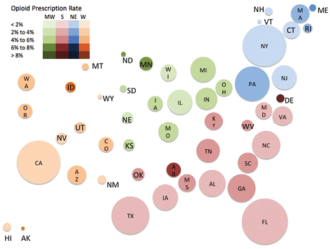
Regional variation in opioid prescribing patterns among otolaryngologists. Area of each circle is proportional to the number of total prescriptions to Medicare Part D beneficiaries (all medications), whereas the color intensity represents the proportion of prescriptions that are for opioids (key shown at inset). Southern (S) states are represented by red, Northeastern (NE) states are represented by blue, Midwestern (MW) states are represented by green, and Western (W) states are represented by orange.
Credit: © 2018 The American Laryngological, Rhinological and Otological Society, Inc.
Background: There is a dearth of research examining the associations between cognitive function and QoL in patients with HNC, despite much research examining QoL and some research examining cognitive function in this population.
Explore This Issue
July 2018Study design: Case series.
Study setting: Henry Ford Health System, Detroit.
Synopsis: Investigators collected data related to cognitive function, QoL, and psychosocial variables from 83 patients with a diagnosis of HNC between August 2015 and December 2016 who had also undergone pretreatment assessment with a clinical health psychologist and a speech and language pathologist. At pretreatment assessment, the Montreal Cognitive Assessment and Functional Assessment of Cancer Therapy–Head & Neck, version 4, were administered along with a semistructured interview to gather data on psychiatric symptoms, social support, and substance use. Patient demographic, clinical, and psychosocial variables were extracted via medical record review.
Of the 83 patients (64 [77%] male; mean age, 59.54 years), cognitive impairment was identified in 55% (n = 46) at pretreatment. The number of depressive symptoms (mean, 2.43 symptoms) was associated with impairments in delayed recall (r = −0.28) and all domains of QoL. Cognitive impairment in delayed recall was associated with lower QoL in both overall QoL and the domains of emotional and functional well-being. Current benzodiazepine use, history of heavy alcohol use, and current and past tobacco use were also associated with lower QoL in specific domains.
Citation: Williams AM, Lindholm J, Cook D, et al. Association between cognitive function and quality of life in patients with head and neck cancer. JAMA Otolaryngol Head Neck Surg.